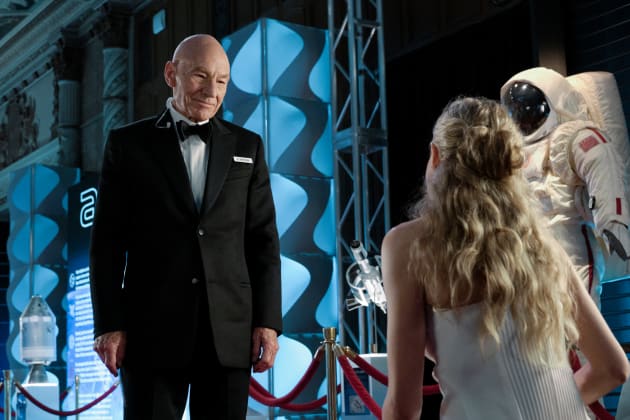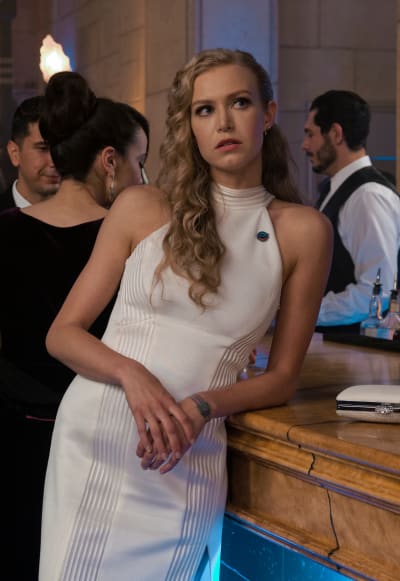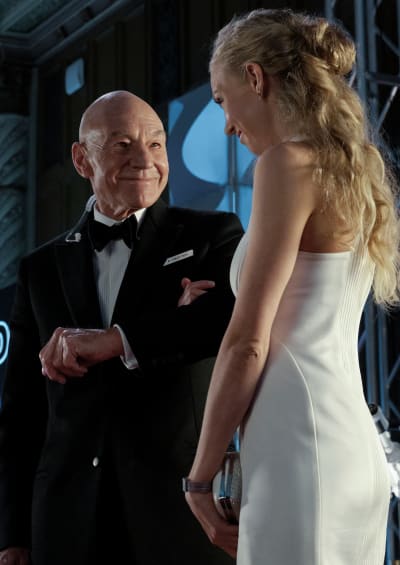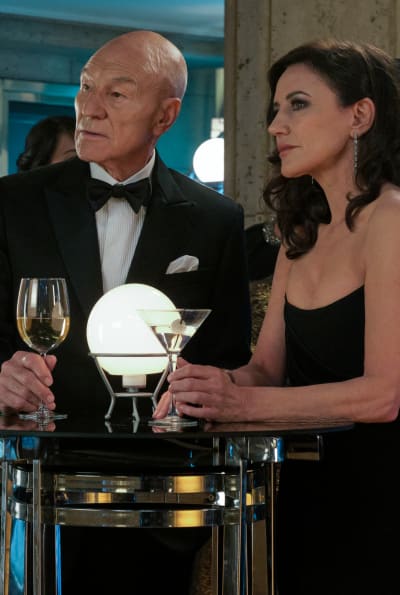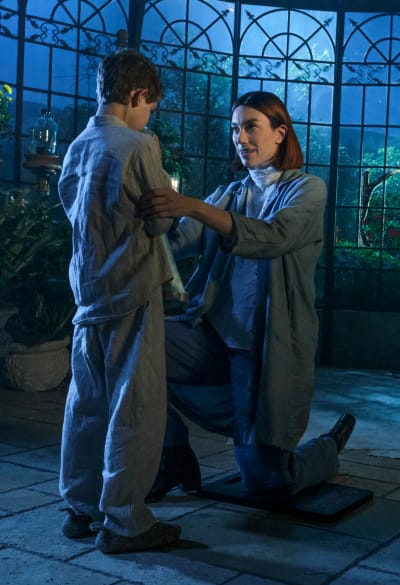For those who rail incoherently about Trek’s shift to serial scripting, Star Trek: Picard Season 2 Episode 6 probably triggers all sorts of blood pressure spikes.
For the rest of us, it’s hella fun. The back-and-forth narrative, the unknown factors, the constant balancing of secrets. Also, that wardrobe! It’s not often we get so fancy on Trek.
Of course, overshadowing everything — including the fact Picard teeters on the brink of death — is Jurati’s stunning chanteuse moment, bursting into a solo rendition of Pat Benatar’s “Shadows of the Night” in front of the entire NASA gala.
Call me old-fashioned, but I love songs with lyrics, and the absolute perfection of the words here thrills the geekiest core of my musical theater kid heart.
Just look at them:
“We’re running with the shadows of the night / So baby, take my hand, you’ll be alright. / Surrender all your dreams to me tonight. / They’ll come true in the end.“
If that isn’t the Borg queen’s exact promise to Jurati, I’ll turn in my Spock ears.
Jurati’s loneliness has always been her key vulnerability. While she has great confidence in herself and her scientific skills, she has none in her ability to interact and integrate with other people.
The Borg queen has targeted that need for connection and belonging ever since the doctor literally let her in her head on Star Trek: Picard Season 2 Episode 3.
Now that she’s living there full-time, things are even more complicated. By tweaking the lyrics in the first verse, the writers spotlight how they’ve merged two voices into one, both in the song and in the story.
“You said, ‘Oh girl, it’s a cold world when you keep it all to yourself.’ / I said, ‘You can’t hide on the inside all the pain you’ve ever felt.’ / Ransom my heart, but baby, don’t look back ’cause we got nobody else.“
It’s a gorgeous moment where staging and meaning are in complete dramatic synchronicity. (And if you’re someone who’s hung up on how either Jurati or the Borg queen knew a song from 1982, you’re definitely reading the wrong reviewer because I don’t freakin’ care.)
Furthermore, well-deserved kudos to the creative team for transitioning from Jurati’s singular moment of social triumph to the Borg queen’s achievement of total cerebral assimilation.
Pesky cortisol levels. It’s beautifully ironic that the elevated stress hormones that Jurati naturally lives with are the only thing that kept the queen from taking control of her sooner.
It worked. Oh, I am proud of you, Agnes. Thank you for the flood of endorphins, by the way. Those nasty little stress hormones were getting in my way.
Borg queen
Happiness appears to be Jurati’s downfall every time.
But, as I said, her center stage moment pulls focus from some significant developments elsewhere.
Renée Picard’s professional insecurities are almost a mirror image of Jurati’s personal ones.
Where Jurati has the queen’s nanoprobes picking away at her identity, Renée has Q the Shrink’s negativity tearing at her confidence.
Renée: Sometimes, fear is a friendly reminder you’re not ready for something.
Picard: No! Fear is fear. It doesn’t speak in riddles. Fear means you’re smart. You understand the risks.
If you haven’t clued into it yet (and, seriously, how could you not?), the theme of Star Trek: Picard Season 2 is CONNECTION.
Renée may have a guardian angel in Tallinn, but the Supervisor’s creed keeps her from providing the young prodigy with any sort of emotional anchor.
Tallinn: Truth is I’ve been protecting Renée from afar for twenty-four years. I may have lost my touch a little when it comes to engaging with humans.
Picard: You’ve never spoken to her in all those years?
Tallinn: It’s not just a rule. It’s a code we live by. No connection. I’m a ghost. It’s the best way to keep her safe.
Without connection, Renée is at the mercy of her own insecurities and psychological sensitivities.
Even a few moments with a total stranger with some words of wisdom to share can make all the difference when you’re drowning in self-doubt.
My concern is that having made that connection, how did seeing Picard run down by a speeding vehicle affect Renée’s newfound determination to carry forth with the Europa mission?
Picard: Sometimes, those who shine the brightest feel the sting of fear and melancholy in ways that others can never understand.
Renée: You’re talking like you know me.
Will she blame herself for his injuries? Will she still try to quit? Was Adam Soong actually successful in his objective of removing Renée from the Europa team?
And speaking of the desperate Dr. Soong, where is his connection? Is it Kore, who has no idea what her “father” is up to most of the time? Is Soong such a megalomanic that he can only connect with someone he created himself?
Does Kore have anyone besides Adam with whom to connect? How will her discovery of her true origins affect that relationship?
There’s a real sense of deja vu with Kore’s discovery that she’s the last in a long, tragic line of Soong-type clones. The parallel with the revelation of Soji’s sleeper synth reality back on Star Trek: Picard Season 1 is impossible to ignore.
Knowing that Arik later takes up Adam’s research, we can assume that Adam doesn’t learn from his hubris.
Adam: All my life, all my life, I’ve invented. Machines, medicine, I knew I could bend the rules, take the risks.
Kore: Were you driving? Do I need to call someone?
Adam: I poured my heart into you. I let myself believe you were the one, you’d make it. And now, after everything I did, realize what I’m capable of doing, I still failed. I’m still going to lose you. My life’s work.
Another question (which I doubt will be answered) is who is the original Kore/Dahj/Soji? Who is the woman all Soongs try to bring to life?
I feel like there has to be a first, human, and probably fallible, person that Adam and Altan Soong (and Data in his artwork) are driven to resurrect through their science.
Making connections isn’t the only test of a character’s humanity. Keeping those connections vital and thriving is a challenging task of maintenance and honesty.
Seven and Raffi appear to be working at it.
Rios and Theresa have the cards stacked against them.
And with Tallinn about to leap into Picard’s subconscious to pull him out of his memory loop, I think we’re about to find out what childhood trauma blocked him from reciprocating Laris’s affection.
What are your best theories as to what we are about to learn?
I had initially thought that Picard’s memories of his mother were informed by Patrick Stewart’s frank and public disclosure of the domestic abuse in the home in which he grew up.
However, as they’ve revealed more about Renée’s personal challenges, I’m beginning to believe there is something different to Yvette Picard’s story.
Did she suffer from bouts of melancholy as well? Are the scenes of her being restrained and dragged away cases of her being prevented from self-harm or manic behavior?
But how does Renée being prevented from joining the Europa mission connect to Picard’s childhood memories?
Will mental health issues be viewed differently in the 23rd century if Renée doesn’t become a high-profile success despite her challenges?
Could Yvette’s influence on young Jean-Luc be removed completely? Or is his escape to the stars motivated by something darker and more aggressive because of how the Wake-Up World Picard remembers his mother?
We’re now into the back half of this very innovative Trek season, and I, for one, am intensely interested in seeing how it all plays out.
Beam your comments down below and ENGAGE your imaginations for all new frontiers!
Diana Keng is a staff writer for TV Fanatic. Follow her on Twitter.
